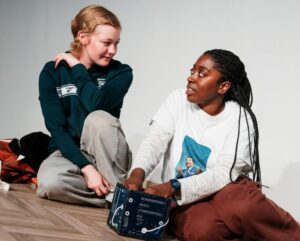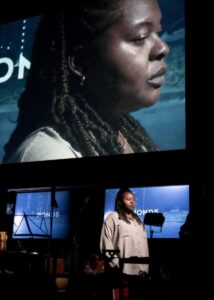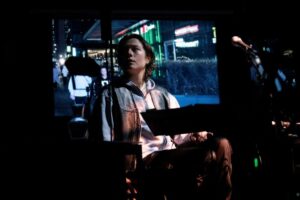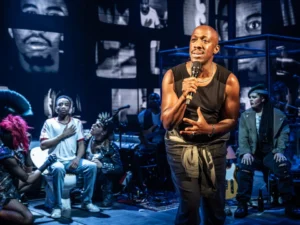Dorfman, National Theatre
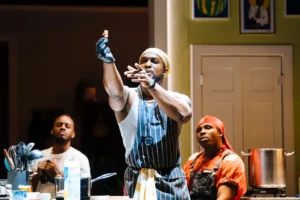
It doesn’t look like Katori Hall‘s Pultizer Prize winning comedy about race, masculinity and homophobia will be winning many awards this side of the Atlantic, if the predominantly three star reviews are anything to go by. The critics like the characters and the comedy in Roy Alexander Weise‘s production, as four black gay men in a Memphis kitchen prepare for a hot wings contest, but they found it overlong and some craved more depth.
[Links to full reviews are included but a number are behind paywalls and therefore may not be accessible]
The Observer’s Kate Kellaway (5 ★) found it ‘a heartwarming, refreshing and original show’. Frey Kwa Hawking at WhatsOnStage (4★) found it long ‘But the characters are so likeable, and being in this house with them is so irresistible, that slowness can’t really be resented.’
Andrzej Lukowski’s review in Time Out (3★) made a similar point: ‘Hall’s play is a pleasure, but there are moments where it feels like an endurance test’. A similar thought came to Alexander Cohen at Broadway World (3★): ‘Hall’s flavours may not always mix and the bombastic jauntiness makes the melodramatic moments feel drawn out by contrast, but so what. This is a summer comfort watch.’ Nick Curtis in The Standard (3★) felt something similar: ‘Though overlong, this is a tasty, stimulating experience.’
The Times’ Clive Davis was warm rather than hot in his review in The Times (3★) saying it ‘trundles along merrily enough without justifying its ample running time.’ Arifa Akbar in The Guardian (3★) enjoyed the ‘humour, Black joy and relationship drama – in that order.’ Sarah Hemming in the Financial Times (3★) found much to appreciate, ‘Weise’s production savours both the playfulness and the emotional truths in the plot, and his cast all give affectionately observed and beautifully rounded performances.’
Claire Allfree in the Telegraph (3★) felt that Hall ‘in the end opts for feelgood emotion’. Dave Fargnoli for The Stage (3★) said, ‘As charismatic and vividly-drawn as these characters undoubtedly are, Katori Hall’s Pulitzer prize-winning culinary comedy tells an overstretched, overfamiliar story.’ Tom Birchenough for The Arts Desk (3 ★) concluded, ‘there’s richness of writing here, and the sheer enjoyment evident from the ensemble cast carries it resoundingly.’
Critics’ Average Rating 3.4★
The Hot Wings King can be seen at the Dorfman, National Theatre until 14 September 2024. Click here to buy tickets directly from the theatre
If you’ve seen The Hot Wings King at the Dorfman, please add your review and rating below

